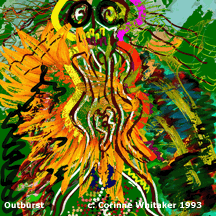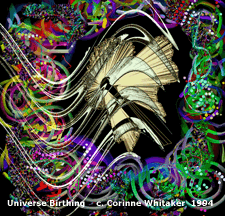
"Butter is a Vegetable"

Or so said Natalie, as I eyed a particularly luscious apricot scone at the tea shop.
If you were a vegetable would you protest? If you were butter would you object to being stripped of your essential butterness to squeeze into a category?
What if lots of people called butter a vegetable: does that change the nature of butter? Do we define ourselves by what someone else, or many someones else, say or think about us?
 What if you were a painter, and the viewing public described
you as a Bubonic: what if they called your work “morally
contagious” and your supporters “lovers of physical and
moral filth”? What if your paintings were described as “the
incarnation of disorder, of a savage wholesale rupture with
tradition”? What if they posted handbills in your community
saying that you “had caused more harm in a year than an
epidemic”?*
What if you were a painter, and the viewing public described
you as a Bubonic: what if they called your work “morally
contagious” and your supporters “lovers of physical and
moral filth”? What if your paintings were described as “the
incarnation of disorder, of a savage wholesale rupture with
tradition”? What if they posted handbills in your community
saying that you “had caused more harm in a year than an
epidemic”?*
It takes guts to stand up to this degree of vituperation. It takes a special kind of internal fortitude to believe in yourself rather than succumb to the blandishments of negativism.
Fortunately for us, Matisse trusted himself.
Do you trust yourself?
Definitions, like labels, serve to freeze life into box-cars of information, easy to access and fuel-efficient (we no longer have to think about them, they are pre-packaged, frozen, and digestible). Labels weave threads of uncertainty into an impenetrable web of identity. Definitions fill our allegories of how the world works, so that we don't really have to think about when the world doesn't work. Maybe this is why I abandoned photography: I couldn't bear to freeze a moment, or a person, in perpetuity. I wanted flexibility, fluidity, the possibility of change, the beauty of continual morphing.
There is beauty in life, inexplicable as it is, that transcends
our feeble attempts to define, categorize, and pin to a wall of
science or belief. Perhaps that's why I keep studying different
languages (I'm now in year two of learning Greek). Perhaps
it is an eternal quest to decipher the unknown, or to see if
anyone else has come up with answers.

Negativism has become an Olympic sport. The media thrives on it: politicians and celebrities and even the Joe the Plumbers are fodder for late night witticisms and journalistic barbs. Where would our psyches be without Letterman and Colbert to tuck us in at night? The current far right on the political spectrum has honed it to a crisp. And yet the “holier-than-thou's”, the bloated ego-balloons of nastiness, have been caught literally and habitually with their pants down. Do they know who they are any more?
If anyone deserves to be negative, it is surely Stephen
Hawking: imagine, if you can, the sheer frustration of housing
such brilliance in a severely damaged structure. Or Beethoven: how
could any reasonable fate have condemned him to deafness?
Yet Beethoven wrote “Ode to Joy”, among other magnificent
outpourings. And Hawking has now decided that “we are
more than our genes”. For anyone like myself who struggles with a genetic
disorder, that is glorious news indeed. In his “Life in the Universe” lecture,
Hawking says that humans have entered into a new stage
of evolution, based on our accumulation of learning and
knowledge. Rather than slide into extinction, as have an
overwhelming number of planetary species, we have
preserved and implemented knowledge that will allow us to
change our very DNA, not only to correct genetic abnormalities
but eventually to improve intelligence and control aggressions.
If we can thus soften the impulse to self-destruct, we will
be able to design machines that can colonize other planets.
In other words, we won't just make replaceable parts
for our aging bodies, but will actually replace the DNA system
itself with another form of being, just as DNA may be the
result of changes in earlier forms of life.

Santa Claus may not have a penthouse waiting for him at the North Pole between holidays. But Natalie and I believe in Santa Claus, no matter what anyone says.
And butter is delicious.
c. Corinne Whitaker 2009

*Quotes from "The Unknown Matisse", Hilary Spurling, Alfred A. Knopf, New York, 1998.
For a further discussion of allegories, see
fictionaries.
The Atlantic
magazine, in a fascinating article called "Get Smarter", also suggests that humans will
use their brains in a process called "fluid intelligence" to overcome extinction. Their
question: "Is Google actually making us smarter?".
